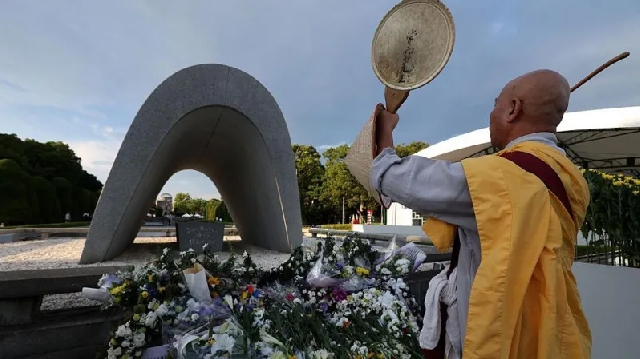Hiroshima marks 80 years since atomic bombing
 Getty Images (Pic): The legacy of the atomic bomb lingers in Japan today
Getty Images (Pic): The legacy of the atomic bomb lingers in Japan today
A silent prayer was held in Japan on Wednesday morning as it marked 80 years since the United States dropped an atomic bomb on the city of Hiroshima.
Japanese prime minister Shigeru Ishiba attended the ceremony on Wednesday, along with officials from around the world and the city's mayor Kazumi Matsui.
Matsui warned of a global "accelerating trend toward military build-up... [and] the idea that nuclear weapons are essential for national defence", saying this was a "flagrant disregard [of] the lessons the international community should have learned from the tragedies of history".
World War Two ended with Japan's surrender after the dropping of the bombs in Hiroshima and Nagasaki.
The bombs killed more than 200,000 people - some from the immediate blast and others from radiation sickness and burns.
The legacy of the weapons continues to haunt survivors today.
"My father was badly burned and blinded by the blast. His skin was hanging from his body - he couldn't even hold my hand," Hiroshima survivor Shingo Naito told the BBC. He was six years old when the bomb struck his city, killing his father and two younger siblings.
Mr Naito has been sharing his story with a group of students in Hiroshima, who are turning his memories of the tragedy into art.
In 2024, Nihon Hidankyo, a Japanese group of atomic bomb survivors won the Nobel Peace Prize for their efforts to rid the world of nuclear weapons.
In a speech on Wednesday, mayor Matsui said that the nuclear Non-Proliferation Treaty, which aims to prevent the spread of nuclear weapons and promote the peaceful use of nuclear energy, was "on the brink of dysfunctionality".
He also called on the Japanese government to ratify the Treaty on the Prohibition of Nuclear Weapons - an international agreement banning nuclear weapons that came into force in 2021.
More than 70 countries have ratified the treaty, but nuclear powers like the US and Russia have opposed it, pointing to the deterrence function of nuclear arsenals.
Japan has also rejected such a ban, arguing that its security is enhanced by US nuclear weapons.
The nuclear issue is a divisive one in Japan. On the streets leading up to the Peace Memorial Park, there were small protests calling for the abolition of nuclear weapons.
Satoshi Tanaka, another atomic bomb survivor who suffered multiple cancers from radiation exposure, said that seeing the bloodshed in Gaza and Ukraine today conjures up his own suffering.
"Seeing the mountains of rubble, the destroyed cities, the children and women fleeing in panic, it all brings back memories of what I went through," he told the BBC. "We are living alongside nuclear weapons that could wipe out humanity multiple times over."
"The most urgent priority is to push the leaders of nuclear-armed countries. The people of the world must become even more outraged, raise their voices louder, and take massive action."
Source: bbc.com
Trending World

First deportees arrive in Rwanda from the US
02:10
Tourist pouring beer down elephant's trunk in Kenya sparks anger
02:07
South African women warned about viral Russian job videos
01:18
France returns slain king's skull to Madagascar
16:59
Child sex abuse victim begs Elon Musk to remove links to her images
16:56
Trump's 50% tariff on India kicks in as Modi urges self-reliance
14:55
Russia outsmarts France with nuclear power move in Niger
14:39
Trump ends Secret Service protection for Kamala Harris
17:46
UK, France and Germany move to reimpose UN sanctions on Iran
02:12




